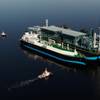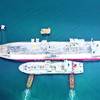Navy to Christen New Guided Missile Destroyer Bainbridge
Assistant Secretary of the Navy for Research, Development and Acquisition John Young will deliver the ceremony's principal address. Susan Bainbridge Hay will serve as sponsor of the ship named for her great great great grandfather. In the time-honored Navy tradition, she will break the bottle of champagne across the bow to formally christen Bainbridge.
Bainbridge honors the outstanding and heroic service of Commodore William Bainbridge who served in the Navy from 1789-1833. Four previous ships have been named in honor of Bainbridge, including the 259 ton brig USS Bainbridge (1842-1863); the Navy's first destroyer USS Bainbridge (DD-1), 1902-1920; another destroyer USS Bainbridge (DD-246), 1921-1945; and the nuclear powered cruiser USS Bainbridge (DLGN-25, later CGN-25), 1962-1997.
Bainbridge is the 46th of 62 Arleigh Burke class destroyers currently authorized by Congress. This highly capable multi-mission ship can conduct a variety of operations, from peacetime presence and crisis management to sea control and power projection, in support of the National Military Strategy. Bainbridge will be capable of fighting air, surface, and subsurface battles simultaneously. The ship contains myriad offensive and defensive weapons designed to support maritime defense needs well into the 21st century.
Cmdr. John M. Dorey of Auburn, Mass., and a 1986 Naval Academy graduate, will become the first commanding officer of the ship, which has accommodations for 380 officers and enlisted personnel. The 9,200-ton Bainbridge is being built by Bath Iron Works. It has an overall length of 511 feet, a waterline beam of 59 feet and a navigational draft of 33 feet. Four gas turbine engines will power the ship to speeds in excess of 30 knots.
General Characteristics, Arleigh Burke class
Builders: Bath Iron Works, Ingalls Shipbuilding
Power Plant: Four General Electric LM 2500-30 gas turbines; two shafts, 100,000 total shaft horsepower.
SPY-1 Radar and Combat System Integrator: Lockheed Martin Length:
Flights I and II (DDG 51-78): 505 feet (153.92 meters)
Flight IIA (DDG 79-98): 509½ feet (155.29 meters)
Beam: 59 feet (18 meters)
Displacement:
Hulls 51 through 71: 8,315 tons (8,448.04 metric tons) full load
Hulls 72 through 78: 8,400 tons (8,534.4 metric tons) full load
Hulls 79 and on: 9,200 tons (9,347.2 metric tons) full load
Speed: in excess of 30 knots
Aircraft: None. LAMPS III electronics installed on landing deck for coordinated DDG 51/helo ASW operations










